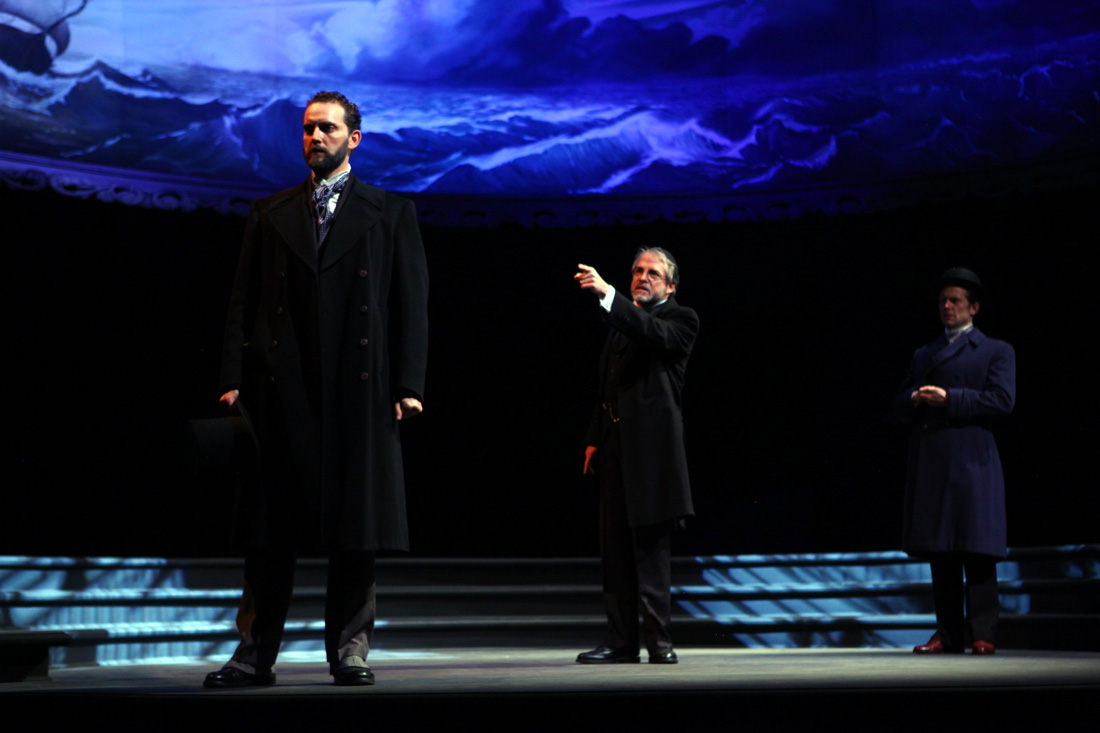New York-based stage director Stephen Fried has previously helmed two productions for Texas Christian University’s annual summer Trinity Shakespeare Festival: Macbeth and Much Ado About Nothing. He’s back this year with a version of The Merchant of Venice, this one set in the 1880s, when the full effects of the Industrial Revolution were being felt throughout Europe. Fried, who’s staged Shakespeare for festivals and companies around the country, directed a stripped-down version of Merchant during his graduate studies at the Yale School of Drama. He didn’t hesitate to return to the Elizabethan playwright’s complex comedy of love, marriage, revenge, and the ever-present but often surprising impact of commerce on our day-to-day lives.
“I think it was Harold Bloom who said that certain of Shakespeare’s plays feel bottomless,” he said. “I feel like Merchant is at the top of that list, though some might argue. There’s a density and breadth of ideas in the play, something deep and dark at the heart of it that you can never quite get to. A lot of the company [in the current TCU production] had not had a huge amount of experience with it before, so they were amazed at the play’s breadth and scope.”
Merchant, written circa 1597, is a strange beast among the Bard’s canon of comedies. It feels like two or three small plays within one large and somewhat chaotic dramatic framework, employing the author’s traditional themes of chance, fateful love, and the triumph of the individual over social conventions. Portia (played at Trinity by Trisha Miller) is an heiress in love with Bassanio (Chuck Huber), who must play a kind of parlor game involving large containers of precious metals to win her hand. Their buddy Antonio (Richard Haratine), a young merchant whose cash is tied up in a fleet of ships at sea, tries to aid their courtship by borrowing money from the spiteful Shylock (Brent Alford), who famously wants his “pound of flesh” if Antonio doesn’t pay up in time. After some fairly typical rom-com antics, the play shifts tone dramatically to a trial involving Shylock’s right to call in his debt.
Merchant features a comic ending in which all the young lovers end up as neatly matched pairs. But some critics have argued the cozy finale is not quite earned by the subplot’s unsettling themes of corrupting greed, the capriciousness of justice, and, especially, the role of Jews in Shakespeare’s time. Shylock is left broken and humiliated, and many actors and directors have struggled to deal with his harsh treatment.
“If you read Marlowe’s The Jew of Malta [which came out a few years before Merchant], Shakespeare seems almost shockingly progressive,” Fried said. “In Marlowe’s play you had this Jewish villain who was almost Mephistophelian, who’d killed these massive amounts of people. Shakespeare has Shylock give the famous lines, ‘I am a Jew. Hath not a Jew eyes, hands, organs, dimensions?’ ”
Fried adds with a small laugh: “But you also get the sense Shakespeare didn’t have a lot of Jewish friends. It would be unreasonable to expect him not to reflect the feelings of his age.”
As a Jewish man, Fried understands the importance of treating Shylock’s situation with a certain amount of care, as mainstream 21st-century attitudes toward Jewish people have changed significantly. But he disagrees with Bloom’s assessment that the events of World War II have rendered The Merchant of Venice virtually unstageable. Moreover, he encouraged actor Alford not to shy away from portraying the unsympathetic aspects of the moneylender, who often acts, as Fried puts it, “in horrendously awful ways.” That’s where a director’s trust in his actors is so important –– Fried said he never had a doubt that Alford would pursue and capture Shylock’s full humanity in his performance. In the end, that’s also Fried’s goal as a director –– to make Shakespeare’s words as immediate and recognizable to contemporary audiences as possible.
“For a lot of people, Shakespeare can be this foreign, rarefied thing,” he said. “I think they come to a show expecting not to fully understand him. But the amazing thing about him was that he wrote about real human beings. I want people to see themselves in the characters.”
[box_info]
The Merchant of Venice
Thru July 1 at Trinity Shakespeare Festival, Texas Christian University, FW. $10-25. 817-257-8080.
[/box_info]











